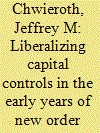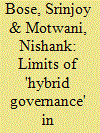| Srl | Item |
| 1 |
ID:
091505


|
|
|
|
|
| Publication |
2009.
|
| Summary/Abstract |
The key argument of this study is that the search for legitimacy by state leaders provides a context in which international conflict takes place. Under different phases, leadeled as state-making phase, state-consolidation phase, and power-prestige phase, state leaders face different opportunities, including conflicts with other states, to enhance legitimacy of their regimes and states.
|
|
|
|
|
|
|
|
|
|
|
|
|
|
|
|
| 2 |
ID:
097909


|
|
|
|
|
| Publication |
2010.
|
| Summary/Abstract |
How do crises lead to change? Rationalist approaches to the question that emphasize inexorable structural responses and the pursuit of distributive preferences by newly dominant coalitions, are inadequate because they obscure the social mediation of material events and the pervasive uncertainty that follows destabilization of the precrisis status quo, which constrains actors from fully grasping their distributive preferences. Until uncertainty is reduced, persuasion emerges as a key mechanism of change. Although constructivist approaches emphasize persuasive practices, they have yet to adequately specify the scope conditions underpinning the selection of new ideas. This article goes beyond much of the constructivist focus on domestic legitimacy and static notions of resonance by emphasizing external credibility and dynamic processes of resonance-building by norm entrepreneurs. The author specifies four features-what he calls the four Cs of crisis resolution-that shape the process of idea selection: carriers, composition, crossover appeal, and credibility. Developing these arguments in the case of the early years of New Order Indonesia, the article suggests that whenever a prominent and cohesive group of advocates promotes an idea that has sufficient ideational and distributive appeal and the endorsement of external actors whose seal of approval is perceived as important, intersubjective belief change, and thus institutional and policy change, is more likely.
|
|
|
|
|
|
|
|
|
|
|
|
|
|
|
|
| 3 |
ID:
133595


|
|
|
|
|
| Publication |
2014.
|
| Summary/Abstract |
The following commentary argues that the strategic and structural solutions proffered by advocates of 'hybrid' governance-encompassing elements from distinctly different ideological backgrounds or schools of thought-ignore or fail to address certain inherent shortcomings in their approach that are counter-productive to the ongoing and long-term statebuilding and peacebuilding projects in Afghanistan. The following study elucidates some of these shortcomings.
|
|
|
|
|
|
|
|
|
|
|
|
|
|
|
|
| 4 |
ID:
113336


|
|
|
|
|
| Publication |
2012.
|
| Summary/Abstract |
Triadic deterrence is the situation when one state uses threats and/or punishments against another state to coerce it to prevent non-state actors from conducting attacks from its territory. Under what conditions is triadic deterrence successful? Some attribute outcomes to the balance of power between states. By contrast, we argue that the complex asymmetrical structure of this conflict requires attention to the targeted regime's relationship to its own society. The stronger the targeted regime, the more likely deterrent action will prove effective. Moving against non-state actors requires institutional capacity, domestic legitimacy, and territorial control, which only strong regimes are able to furnish. Whereas strong regimes can act to uphold raison d'état, weak regimes lack the political tools and incentives to undertake controversial decisions and enforce them. We illustrate this argument through analysis of between- and within-case variation in Israel's attempts to deter Palestinian groups operating from Egypt between 1949 and 1979, and from Syria since 1963.
|
|
|
|
|
|
|
|
|
|
|
|
|
|
|
|